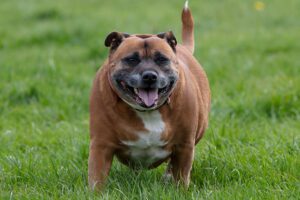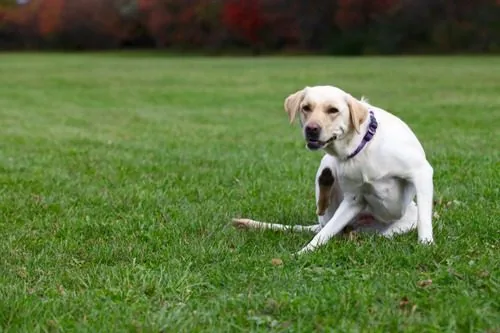Dog Obesity: When is this a Health Concern?
Dog obesity is not just about a little extra weight; obesity in dogs can lead to serious health problems. Understanding when dog obesity becomes a health concern is key to keeping your furry friend healthy and happy. If you’re worried about your dog’s weight and its impact on their health, our team at The Village Vets in Georgia is here to help.

Recognizing Dog Obesity
Knowing whether your dog is obese is the first crucial step in ensuring their health and well-being. Obesity in dogs isn’t always easy to spot, especially with certain breeds that naturally have a more robust build. Here’s how you can tell if your dog might be carrying unhealthy extra weight:
- Body Shape Assessment: A healthy dog typically has an identifiable waistline when viewed from above. If your dog’s body looks more like a rectangle than an hourglass, it’s a sign they might be overweight.
- Ribs Visibility: You should be able to feel your dog’s ribs without pressing hard. If you can’t feel their ribs, or if there’s a thick layer of fat over them, it’s a sign of excess weight.
- Lack of Energy: Overweight dogs often show less interest in activities they used to enjoy. If your dog is less eager to play, go for walks, or tires easily during exercise, it could be due to extra weight.
- Breathing Difficulty: Dogs carrying extra weight may also have difficulty breathing, even with mild exertion.
- Behavioral Changes: Overweight dogs might seem lethargic or uninterested in activities they used to enjoy. They might also have difficulty getting up, climbing stairs, or jumping onto furniture.
- Health Issues: Overweight dogs are more prone to health problems like joint pain, diabetes, and heart disease. If your dog has developed any health issues recently, consider whether their weight could be a contributing factor.
Understanding the Dangers
Obesity in dogs is not just a cosmetic issue; it’s a health concern. Excess weight can lead to various problems, including heart disease, diabetes, joint and bone disorders, and a shorter lifespan. It can also exacerbate existing health issues and make it harder for vets to diagnose and treat other conditions.
Causes of Dog Obesity
Several factors contribute to dog obesity, including overfeeding, lack of exercise, and genetics. Sometimes, underlying health issues like hormonal imbalances can also lead to weight gain. Understanding the cause is essential for effective management and treatment.
Diet and Nutrition
Proper diet and nutrition are crucial in managing your dog’s weight. It’s not just about feeding less but feeding right. High-quality dog food, appropriate portion sizes, and limited treats are important. Read food labels, and consider working with your vet to create a diet plan that suits your dog’s specific needs.
Keeping Your Dog Active
Regular exercise is essential for weight management in dogs. Daily walks, playtime, and other physical activities help burn calories and maintain muscle tone. Tailor the exercise to your dog’s age, breed, and physical condition.
Monitoring Weight Changes
Regularly monitoring your dog’s weight is key to managing obesity. Keep track of their weight changes, and adjust their diet and exercise routine as needed. Regular check-ups with your vet can help track your dog’s progress.
Seeking Professional Help
If you suspect your dog is obese, it’s important to consult with a vet. They can assess your dog’s health, rule out any medical causes of weight gain, and provide guidance on diet and exercise. They can also help set realistic weight loss goals for your dog.
Managing Obesity in Senior Dogs
Dealing with obesity in senior dogs requires a gentle and careful approach. As dogs age, their metabolism slows down, and they become less active, making them more prone to weight gain. Here’s how you can effectively manage obesity in your older dog:
- Adjusted Diet for Senior Dogs: Senior dogs have different nutritional needs. Consider switching to a senior-specific dog food that’s lower in calories but still provides all the necessary nutrients. These foods are formulated to maintain muscle mass and joint health while preventing unnecessary weight gain.
- Controlled Portion Sizes: Monitor your senior dog’s portion sizes closely. Feeding them smaller, more frequent meals can help manage weight effectively. Avoid the temptation to give too many treats, and when you do, opt for low-calorie options.
- Gentle Exercise: While exercise remains important for senior dogs, it should be appropriate for their age and physical condition. Short, gentle walks and light play can help maintain muscle tone and joint mobility without overexerting your older dog.
- Regular Vet Check-ups: Regular check-ups become even more important for senior dogs. Your vet can monitor your dog’s weight and overall health, adjusting their diet and exercise regimen as needed. They can also identify and treat any underlying health issues that may contribute to weight gain.
- Joint Health: Obesity in senior dogs can exacerbate joint problems like arthritis. Keeping your dog at a healthy weight can help reduce joint pain and improve mobility. Your vet may recommend supplements like glucosamine and chondroitin to support joint health.
- Comfortable Living Environment: Make your senior dog’s living environment as comfortable as possible. Easy access to their bed, food, and water without having to climb stairs or jump can help maintain their quality of life as they manage their weight.
- Mental Stimulation: Keeping your senior dog mentally stimulated is as important as physical exercise. Interactive toys, puzzles, and short training sessions can help keep their mind active, compensating for the reduced physical activity.
Understanding the Limits
Be aware of your senior dog’s physical limitations and never push them beyond their comfort zone. The goal is to maintain a healthy weight while ensuring their overall well-being and happiness.
The Role of Medication
In some cases, your vet might recommend medication to help manage obesity, especially if it’s linked to a medical condition. Always follow your vet’s advice and never give your dog any medication without consulting them first.
Staying Ahead of the Problem
Preventing dog obesity is easier than treating it. Maintaining a balanced diet, regular exercise, and routine vet check-ups are key. Be mindful of your dog’s calorie intake and adjust their lifestyle as they age.
Conclusion
Dog obesity is a serious health concern that requires attention and action. With the right diet, exercise, and veterinary care, you can help your dog reach a healthy weight and enjoy a better quality of life. Remember, at The Village Vets in Georgia we’re here to support you and your dog every step of the way. If you’re concerned about your dog’s weight or health, don’t hesitate to give us a call. Together, we can keep your furry friend healthy, active, and happy!
Recent Posts
About The Village Vets
The Village Vets is a network of animal hospitals based in Atlanta, GA and the surrounding area. We offer honest, excellent service to our clients in a comfortable, friendly atmosphere. To learn more about our locations and how we can better serve you and your pet, click the button below.
Share This Post
Recent Posts
About The Village Vets
The Village Vets is a network of animal hospitals based in Atlanta, GA and the surrounding area. We offer honest, excellent service to our clients in a comfortable, friendly atmosphere. To learn more about our locations and how we can better serve you and your pet, click the button below.



